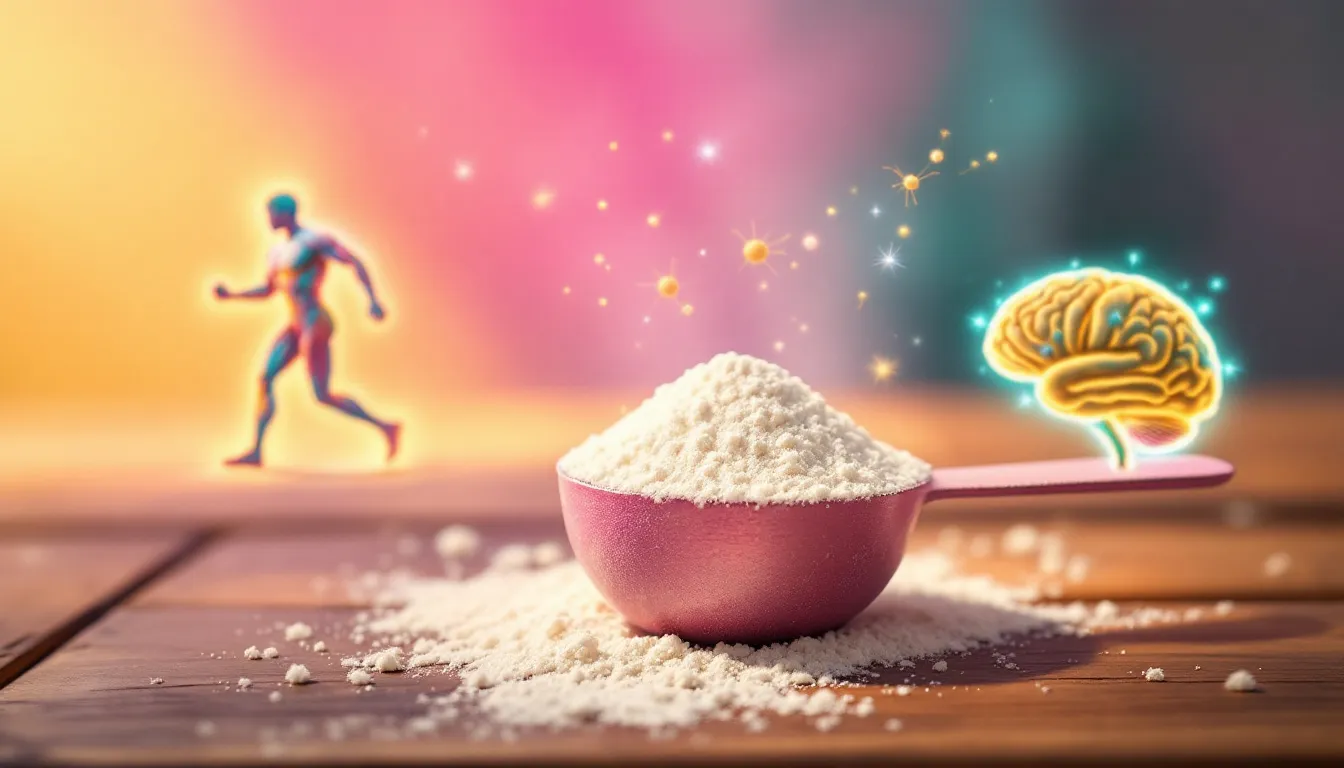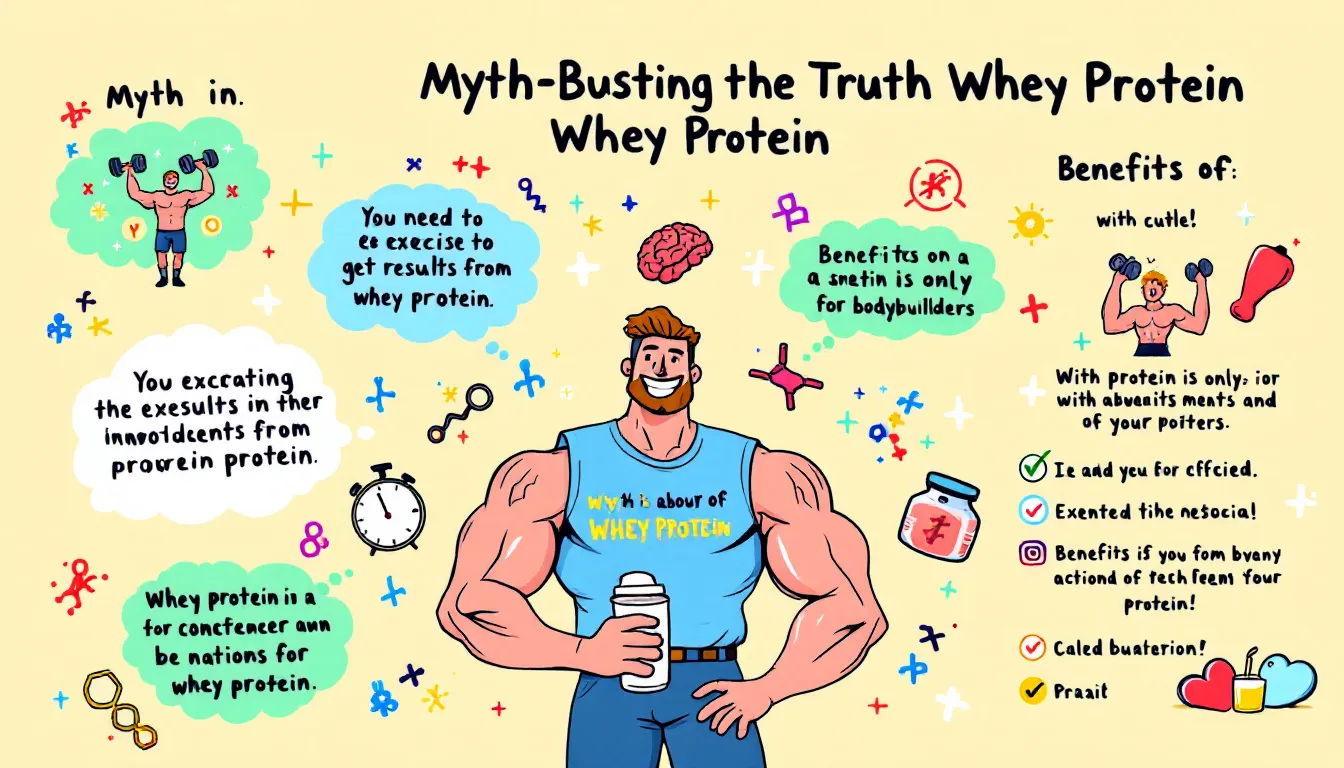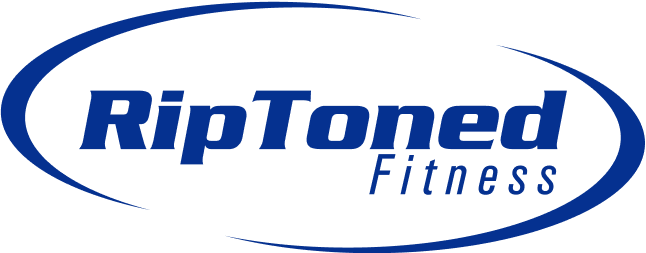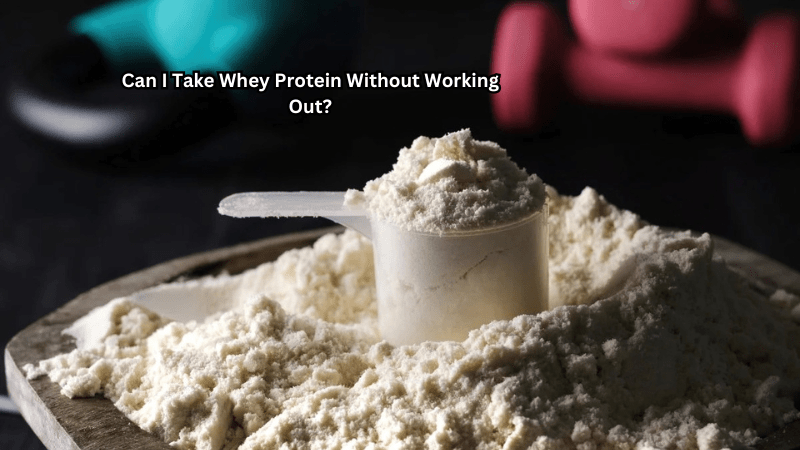Can I take whey protein without working out? The short answer is yes. But what happens then?
Can I take whey protein without working out? The short answer is yes. But what happens then?
This article delves into the benefits and potential drawbacks of consuming whey protein without exercise. Discover how it affects your health, weight, and more.
Key Takeaways
- Whey protein provides health benefits even without workouts, such as supporting immune health and aiding weight management.
- Excessive protein intake without exercise can lead to weight gain, kidney strain, and limited muscle growth, so moderation is key.
- Whey protein can help meet daily protein needs when included as part of a balanced diet, but should be combined with whole foods for the best results.
Understanding Whey Protein
What exactly is whey protein? Whey protein is a by-product of cheese production, sourced from the watery component of cow’s milk. It consists primarily of β-lactoglobulin, α-lactalbumin, and immunoglobulins, making it a highly nutritious option. One of the standout features of whey protein is its complete amino acid profile, which includes high levels of leucine and cysteine, essential for muscle health. This rich essential amino acid content contributes to the high quality of whey protein.
Whey protein is commonly used for muscle building, weight management, and enhancing satiety. It’s a versatile supplement that can be easily incorporated into various diets, whether you’re looking to build muscle, manage your weight, or ensure you’re getting enough protein.
If you consume whey protein without working out, you may not see the same benefits as when paired with exercise. Additionally, excess protein intake could lead to weight gain over time. Let’s explore the potential benefits first.
Benefits of Whey Protein Without Exercise

Surprisingly, whey protein offers several health benefits even if you’re not hitting the gym regularly. For starters, it can help maintain physical wellness and impart strength. Incorporating whey protein into your diet can improve overall fitness and well-being due to its numerous health benefits. For example, it helps lower blood pressure and boosts nitric oxide production, contributing to heart health. Additionally, whey protein regulates blood sugar levels and enhances insulin sensitivity, which is beneficial even without exercise.
Whey protein is particularly beneficial for older adults as it helps meet their higher protein needs and is easier to consume. To meet their daily protein needs, individuals can drink whey protein shakes, which provide essential amino acids, even without physical activity.
Now, let’s break down these benefits, starting with how whey protein supports the immune system.
Supports Immune System
One of the lesser-known benefits of whey protein is its ability to bolster the immune system. Whey protein contains essential amino acids and bioactive compounds that enhance the body’s defense mechanisms. These bioactive compounds are particularly effective in promoting the production of antibodies, which are crucial for a robust immune response.
Adequate protein intake is essential for maintaining a healthy immune system. Adequate high-quality protein supports the body’s ability to fight infections and specific health concerns. Even without exercise, adding whey protein can maintain a robust immune system.
Aids Weight Management
Another significant benefit of whey protein is its role in weight management. Whey protein can assist in weight control by promoting feelings of fullness and reducing overall calorie intake. This means you are less likely to indulge in unhealthy snacks, helping you manage your body weight more effectively.
Whey protein helps suppress appetite, but it does not cause weight loss on its own. Including whey protein in a balanced diet can curb cravings and assist in calorie management. Foods like legumes, nuts, and dairy complement protein intake, ensuring a balanced diet. This can be particularly useful for those looking to maintain a healthy weight without engaging in regular exercise.
Potential Downsides of Consuming Whey Protein Without Working Out
While there are benefits to taking whey protein without exercising, it’s also important to be aware of the potential downsides. Taking whey protein without exercise can have negative health effects. For instance, possible consequences include bloating, weight gain, and kidney strain. High protein intake without exercise can limit muscle gain and cause weight gain.
Excessive protein intake may place strain on the kidneys, potentially harming kidney function and increasing pressure. High protein levels can slow kidney metabolism, leading to complications in healthy and unhealthy individuals.
While whey protein is generally safe for kidney function unless there are pre-existing kidney issues, staying hydrated is essential. Let’s delve deeper into these potential downsides, starting with limited muscle growth.
Limited Muscle Growth
One of the primary benefits of whey protein is its ability to stimulate muscle protein synthesis, which is crucial for muscle growth. However, the absence of exercise limits the stimulation needed for muscle protein synthesis, reducing the effectiveness of whey protein for muscle growth. Without exercise, protein shakes have a limited impact on muscle synthesis. Physical activity is essential to maximize the benefits of protein shakes.
To maximize the benefits of whey protein for muscle growth, it must be paired with a balanced diet and adequate training. Incorporating exercise is essential for achieving substantial muscle growth and optimizing the muscle-building potential of whey protein.
Risk of Weight Gain
Another potential downside of consuming whey protein without exercise is the risk of weight gain. Excess protein intake beyond what the body needs can lead to energy being converted and stored as fat. Protein intake supports muscle recovery and growth, but without exercise, excess protein may lead to weight gain.
It’s crucial to consider the overall calorie intake when consuming protein shakes to prevent unintended weight gain. Tracking total calorie consumption helps manage weight effectively when including protein shakes in the diet.
So, if you’re not working out, keep an eye on your calorie intake to avoid unwanted weight gain.
Kidney Strain
High protein intake may increase the workload on kidneys, potentially causing harm, especially in individuals with pre-existing kidney issues. A high protein diet may be a concern for kidney health if advised due to a medical condition. When protein intake exceeds the body’s needs in sedentary individuals, it can cause a lack of energy and may lead to feeling sick.
Monitoring protein intake to align with your body’s needs and health. Hydration and consulting a healthcare professional can mitigate risks associated with whey protein consumption without exercise.
How Much Whey Protein Should You Take?

Determining the right whey protein amount is crucial, especially without exercise. A sedentary adult’s protein requirement is 0.8 grams per kilogram of body weight. For an average person weighing 165 pounds (75 kilograms), daily protein intake should be around 60 grams. For older adults, the recommended protein intake may increase to about 1-1.2 grams per kilogram to counteract muscle loss.
The recommended daily serving of whey protein for inactive individuals is 1-2 servings. Most protein intake for those not working out should come from food sources. A scoop of protein powder can account for 20 to 50 percent of the daily recommended protein intake. This makes it a useful supplement for those looking to meet their protein needs.
Combining protein shakes with whole foods ensures you consume protein shakes for comprehensive nutrient intake.
Can Whey Protein Be Part of a Healthy Diet Without Exercise?

Absolutely! Whey protein can be part of a healthy diet even without regular exercise. Whey protein helps in tissue development and repair, serving as a vital component for overall health. Consuming whey protein can effectively meet daily protein needs, provide essential nutrients, and support overall health.
Protein is essential for overall health, regardless of exercise, and should be integrated into a balanced diet. While whole foods should be the primary source of protein, whey protein can assist in maintaining overall health and nutrition regardless of exercise frequency.
Here’s how whey protein can be used as a meal replacement and to supplement protein intake.
Meal Replacement Options
Whey protein shakes can provide essential nutrients as meal substitutes. Protein shakes can help manage weight by serving as meal replacements, reducing calorie intake, and increasing satiety.
However, it’s important to ensure these shakes are part of a balanced diet, not the sole nutrition source. Adding leafy greens, seeds, and fruits can enhance the nutritional value of protein shakes for a more balanced meal.
Supplementing Protein Intake
Whey protein serves as an effective supplement to help meet daily protein requirements when dietary sources are lacking. Whey protein can significantly enhance intake for those struggling to meet protein needs through food.
Including whey protein in your diet can help meet nutritional needs and prevent deficiencies. This is particularly beneficial for individuals with specific dietary restrictions or those who find it challenging to consume enough protein-rich foods, including protein supplements.
Tips for Consuming Whey Protein Without Working Out
Considering adding whey protein to your diet without exercise? Here are some tips. First, include protein shakes in a well-planned diet, considering sugar and fat content. Be mindful of the amount consumed and the sugar or fat content.
Check labels and ingredient quality when choosing a protein shake. Balance protein intake with other macronutrients for optimal health. Ingredients like chocolate, seeds, or yogurt can enhance the nutritional value of protein shakes.
Now, let’s discuss balancing whey protein with whole foods and monitoring caloric intake.
Balance with Whole Foods
Good whole food sources to increase protein intake include fish, chicken breast, and eggs. A balanced diet that includes high-quality protein is essential for overall health and well-being.
Incorporating high-quality protein sources from whole foods can enhance the benefits of whey protein when included in meals. Balancing protein intake by integrating whey protein and high-quality foods is essential for a healthy diet.
Monitor Caloric Intake
Monitoring your caloric intake is essential to maintaining a healthy weight. Excess caloric intake can lead to weight gain, especially if not offset by physical activity.
Whey protein contributes to overall caloric intake, so account for it in your daily goals. Maintain a balanced caloric intake by focusing on portion control and integrating whey protein with whole foods.
Common Myths About Whey Protein Without Exercise

Several myths exist about whey protein consumption without exercise. Many believe whey protein helps with muscle mass gain even without exercise. However, muscle growth is limited without resistance training.
Protein shakes alone won’t build strong muscles without a workout regime. Drinking protein shakes without working leads to ineffective results, much like consuming extra food without effort. Pair protein intake with physical activity to achieve the desired benefits.
Summary
In conclusion, whey protein can offer numerous health benefits, even if you’re not working out, from supporting the immune system to aiding in weight management. However, consuming whey protein without exercise also comes with potential downsides, such as limited muscle growth, risk of weight gain, and kidney strain. It’s essential to balance protein intake with whole foods and monitor your caloric intake to maintain overall health.
Ultimately, while whey protein can be a valuable addition to your diet, it’s crucial to consume it mindfully and in moderation. Whether used as a meal replacement or to supplement protein intake, make sure it aligns with your dietary goals and health needs. Remember, the key to reaping the benefits of whey protein lies in a balanced and well-rounded approach to nutrition.
Frequently Asked Questions
Can I take whey protein without working out?
You can take whey protein even if you're not working out! Just keep an eye on your intake to avoid potential weight gain or strain on your kidneys.
Can whey protein be used as a meal replacement?
Whey protein shakes can serve as a meal replacement since they provide essential nutrients and can help you manage your calorie intake. Remember to incorporate them into a balanced diet instead of relying on them alone for all your nutritional needs.


